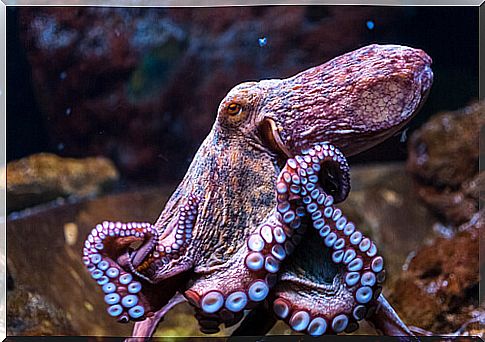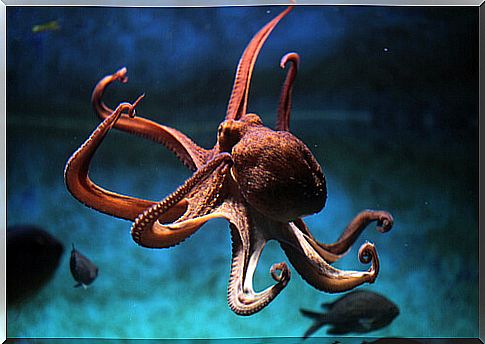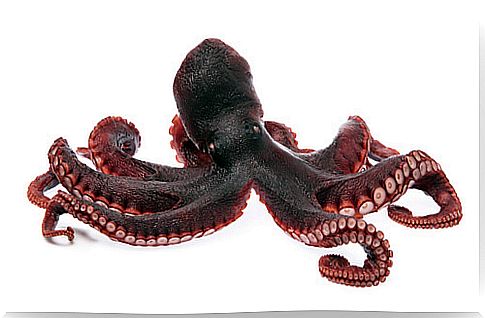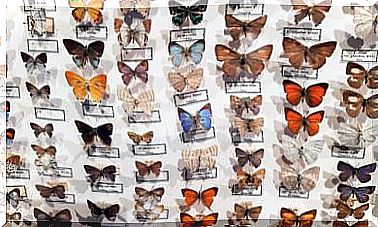Animals Difficult To Tame: The Octopus

The octopus is one of the most striking marine animals due to its unmistakable appearance, its large bulb-shaped head and its various tentacles. However, these mollusks also stand out for their great intelligence and can easily get bored if their mind is not well stimulated.
Next, we will go beyond the presentation of the basic characteristics and habitat of octopuses. We will talk about the amazing cognitive ability of the octopus and its curious ability to get bored. It is about getting to know this interesting species more and better.
Some basic facts about octopuses
Octopuses are cephalopod mollusks, which have eight tentacles (octopods) full of suction cups. Like squid and cuttlefish, octopuses lack the characteristic external protection of mollusks such as mussels.
It is a carnivorous animal, whose diet is based on the consumption of a wide variety of marine animals. The octopus diet includes crustaceans (lobsters, crabs and shrimp), mollusks (clams and mussels), and a great diversity of fish.
This curious species from the sea also eats algae to supplement its nutrition, as they offer a high supply of high-quality fiber, vitamins, minerals and proteins.
Interestingly, the striking giant octopuses can consume large fish, such as sharks. In addition, they can take the opportunity to capture small birds that splash absent-mindedly on the surface of the water.

Habitat and longevity of the octopus
The octopus shows a preference for the salty waters of tropical and temperate regions. They generally live near coral reefs, where they find many crevices and holes to make their ‘lairs’. They can also live under rocks to protect themselves and hide from predators.
However, thanks to its privileged adaptive capacity, its population has expanded to almost all the world’s oceans. Interestingly, it is observed that the specimens that live in warmer areas are small or medium-sized, while the cold-water octopuses stand out for their large size.
The longevity of octopuses is highly variable and depends mainly on the species that is analyzed. In captivity, this mollusk can live for about five years in optimal conditions. However, its life expectancy in the natural habitat is calculated between one and two years.
The great intelligence of octopuses and their ease to get bored
According to experts, the cognitive capacity of octopuses can be compared, in some theoretical aspects, to that of human beings. However, their evolution has been so different from ours that it is impossible to establish a real pattern of comparison between our intelligences.
Just to mention one example: octopuses have only a third of their neurons in their brain. The other two thirds are distributed by its tentacles, so its nervous system is very complex and its ‘arms’ have sophisticated reflexes.

Why are octopuses easily bored?
Although its intelligence was already highly recognized, a surprising and striking fact is that the octopus gets bored very easily. The reason for his ‘easy boredom’ is precisely his ease of learning and memorizing the challenges that are proposed to him.
Researchers at the California Academy of Science have been surprised to perceive octopuses’ high need for mental stimulation. They need to regularly introduce them to new games and puzzles so that they stay mentally active and have a stable behavior.
The strange and controversial experimentation with ecstasy in octopuses
Biologists Eric Edsinger and Gül Dölen have come up with a controversial and strange experimentation on the nervous system of the octopus and its possible similarities to humans.
To do this, they have decided to pour liquid ecstasy into the octopus’ water in a controlled environment. Their goal was to observe their nervous response and social behavior after exposure to the hallucinogenic substance.
They have been surprised to observe that, like humans, octopuses become more friendly or sociable with the effect of ecstasy. This happens because its molecules combine with a protein in neurons, which produces high levels of serotonin, better known as ‘the happiness hormone’.
The most curious thing is that this protein is found in the SLC6A4 gene , which makes up the genome of octopuses and humans. For this reason, his research again opens the doors to the possibility that there are more coincidences between the intelligence and the nervous system of people and mollusks.









